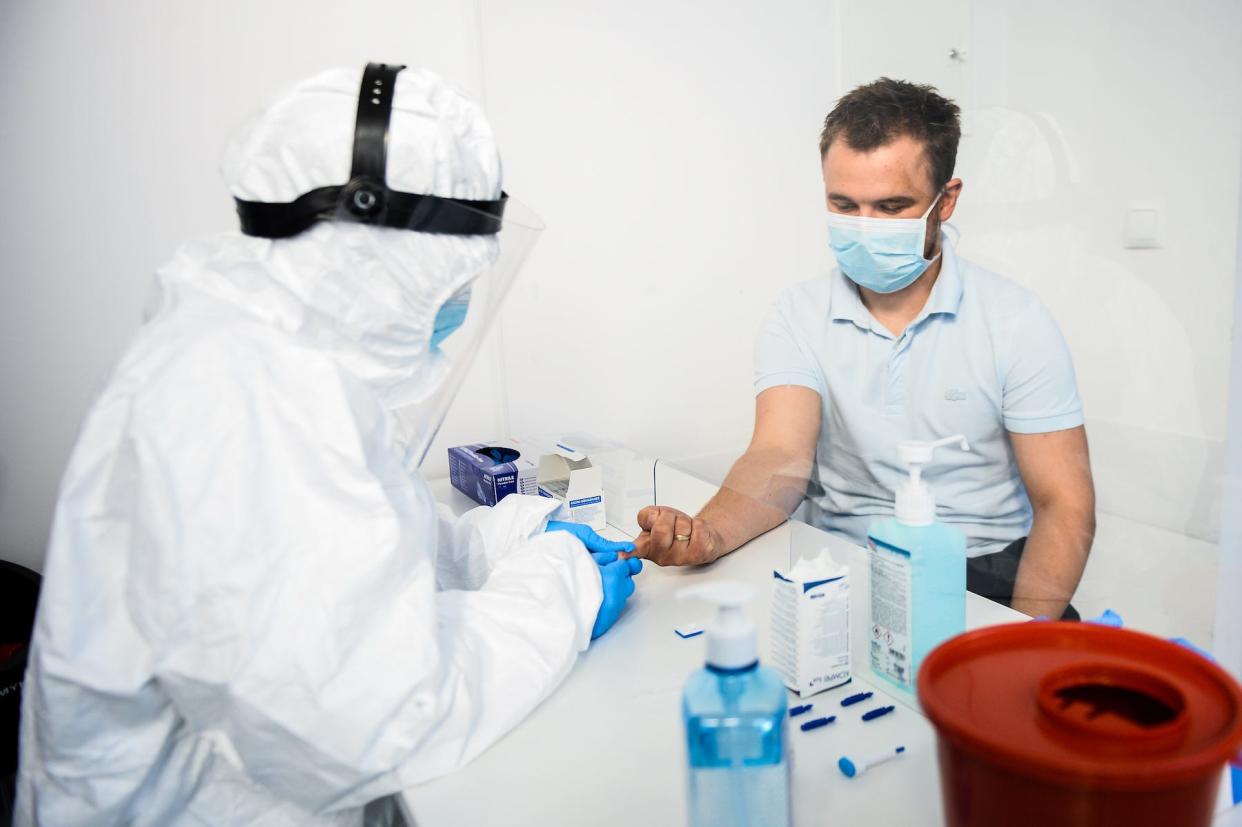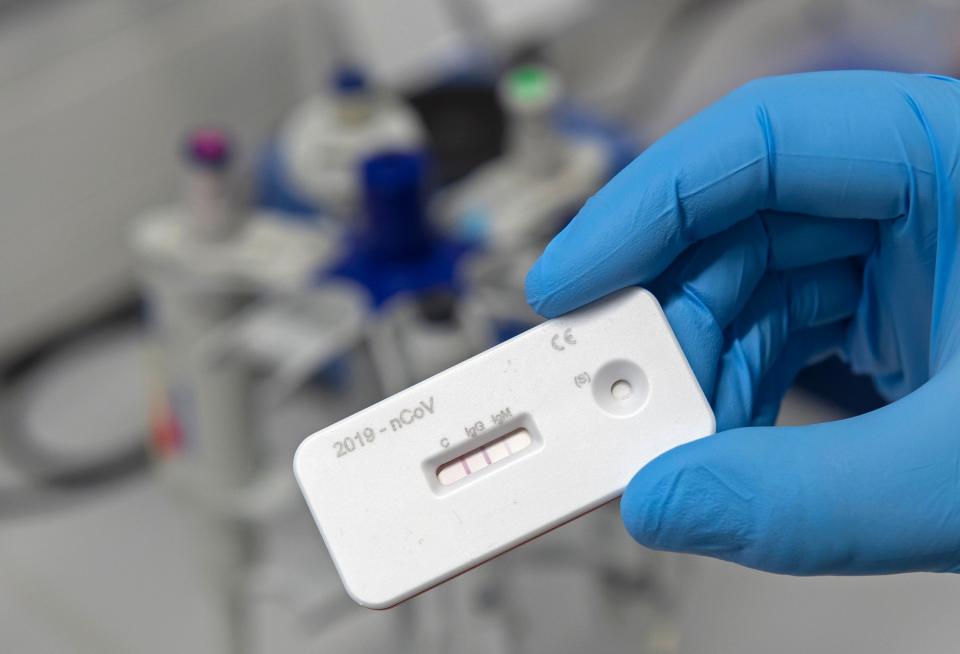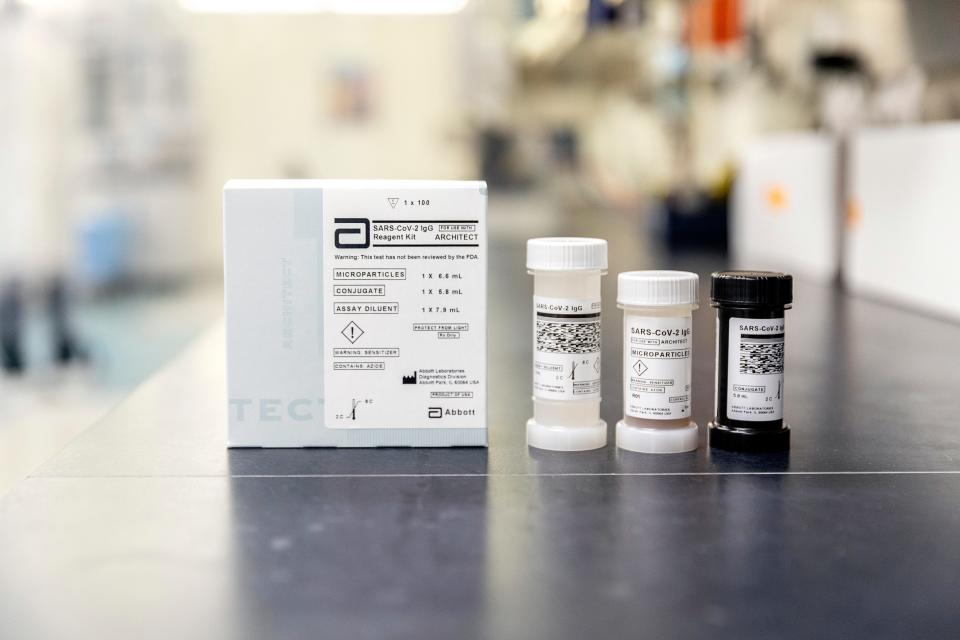A researcher behind one of the most accurate antibody tests available explains when you should get tested — and how to understand your results

Omar Marques/Getty Images
Researchers at New York's Mount Sinai Hospital shared the results of their coronavirus antibody test this week.
Almost every patient in the study who tested positive for a coronavirus infection later tested positive for antibodies. That means false negatives are unlikely.
The hospital's director of clinical antibody testing said people should wait at least three weeks after their symptoms appear to get tested.
Patients who test positive likely have immunity to the virus, but questions linger about how long immunity will last.
As states and countries begin rolling back their lockdown restrictions, the results of widespread antibody testing may guide policies on whether schools can reopen or employees can return to work. But for some people who have received one of these tests, the results have yielded more questions than answers.
Not all coronavirus antibody tests are the same. A team of Bay Area researchers recently evaluated 14 on the market and found that only three were consistently reliable. Many of the tests produced false positives, meaning they signaled antibodies that a person didn't have.
Plus, the results can be skewed based on when a person gets tested over the course of their illness, according to Ania Wajnberg, the director of clinical antibody testing at Mount Sinai Hospital in New York.
Mount Sinai recently shared results from its own antibody testing project; the test was approved for clinical use by the US Food and Drug Administration in April. The findings showed that all but three of the 600-plus patients who had confirmed coronavirus cases tested positive for antibodies. Of more than 700 "suspected cases" — people who had coronavirus symptoms and lived with someone who tested positive or were told by a doctor that they likely had the virus — only 38% tested positive for antibodies.
"I think there's a lot of people that think maybe they had it who didn't," Wajnberg said.
Wajnberg offered advice about when to get tested and how to understand your results, based on her team's research.
Certain tests could provide a better indication of long-term immunity
Different tests screen for different antibodies. In Mount Sinai's case, the test looks for immunoglobulin G (IgG), the most common antibody found in blood and other body fluids. Other tests may screen for immunoglobulin M (IgM), which also circulates in the blood, or immunoglobulin A (IgA), an antibody found mainly in the respiratory and digestive tracts.
In general, our bodies make IgM first in response to a viral infection. IgM is also associated with more acute viral infections, whereas IgG develops over a longer period of time. That means IgG is usually a better indicator of long-term immunity, but coronavirus patients who get tested shortly after developing symptoms may not have produced these antibodies yet.
Scientists haven't determined if IgG antibodies confer immunity to this particular coronavirus, but the Mount Sinai researchers found that some level of protection is likely.
"Even though we don't know what's going on with this disease yet, if IgG confers immunity, that's the more important one that has implications for going back to work," Wajnberg said.
The Bay Area researchers found that IgM tests produced more variable results than IgG tests, but the most consistent results came from testing for both antibodies at once.
Wait 3 weeks to get an antibody test if you're sick
In the Mount Sinai study, 113 patients who were confirmed to have had the virus initially tested negative or "weakly positive" for antibodies; but when they were tested a second time, the majority tested positive for antibodies.
"In order to get the most meaningful results, the antibody tests are best if you wait a full three weeks after the start of your illness," Wajnberg said. "We even saw a small difference in our paper at 24 days versus 20 days."

Jens Meyer/AP
Patients may even want to wait four weeks to be safe, she added, but they shouldn't worry that the antibodies will disappear if they wait too long. For other coronaviruses like SARS and MERS, IgG antibodies seemed to peak within months of an infection and last for a year or more.
"It is confusing for people because the viral tests are almost the opposite," Wajnberg said. "Those you want to do the minute you're not feeling well, because if you wait a month and you're feeling better, then the viral test might be negative."
Patients should be symptom-free for 2 weeks
Wajnberg recommended waiting two weeks after symptoms resolve to get an antibody test, though she said a patient who has been sick for a few weeks or more is likely to have developed antibodies by that point.

Abbott
All patients involved in the Mount Sinai study were fully recovered — meaning they felt close to normal — by the time they received their antibody test.
"Not everybody was back to fully 100%, but I would say 90-plus," Wajnberg said.
Around 19% of the patients tested positive for an active infection after their symptoms resolved. Wajnberg said it's possible that those patients were still contagious, but the more likely scenario is that they were shedding dead virus.
"What we're finding on the swab is not infectious live virus — it's dead virus or fragments of virus or even virus eaten up by your immune system," she said.
According to Wajnberg, there's no reason to think that severe cases lead the body to produce more antibodies, since almost every patient in the Mount Sinai study had mild or moderate illnesses.
"In some viruses, the more severe you are, the higher antibodies you make. This study would suggest that that's not really the case," she said. "But we just don't know yet."
The researchers also found that the duration of symptoms didn't influence a person's antibody response. Instead, Wajnberg said, the amount of antibodies a person produces may be related to innate differences in people's immune responses.
Antibody tests could produce false negatives, but false positives are more likely
With any coronavirus antibody test, researchers establish a minimum threshold of antibodies that are required for the results to come back positive. Wajnberg said the Mount Sinai team set a relatively high threshold to prevent people from testing positive with a low antibody count — which could perhaps lead people to false assumptions that they had immunity to the virus.
"The lower you set a threshold, the more likely you are to have false positives," she said.
The study's results indicate that false negatives are very unlikely, though not impossible.
"With the numbers of people we're testing, even at a high sensitivity and specificity, you're still going to have false results — that's true of any test in the whole world," Wajnberg said.
Researchers also still don't know the specific levels of antibodies required for a person to be fully immune; even patients with a lower threshold might still be protected. But there's still a lot to learn, Wajnberg said.
"It's super frustrating for people when they feel sure that they had [the coronavirus] and then the tests are not bearing that out," she said. "This is a crazy situation where we almost want to test everyone on Earth because we know that the tests aren't perfect."
Read the original article on Business Insider

